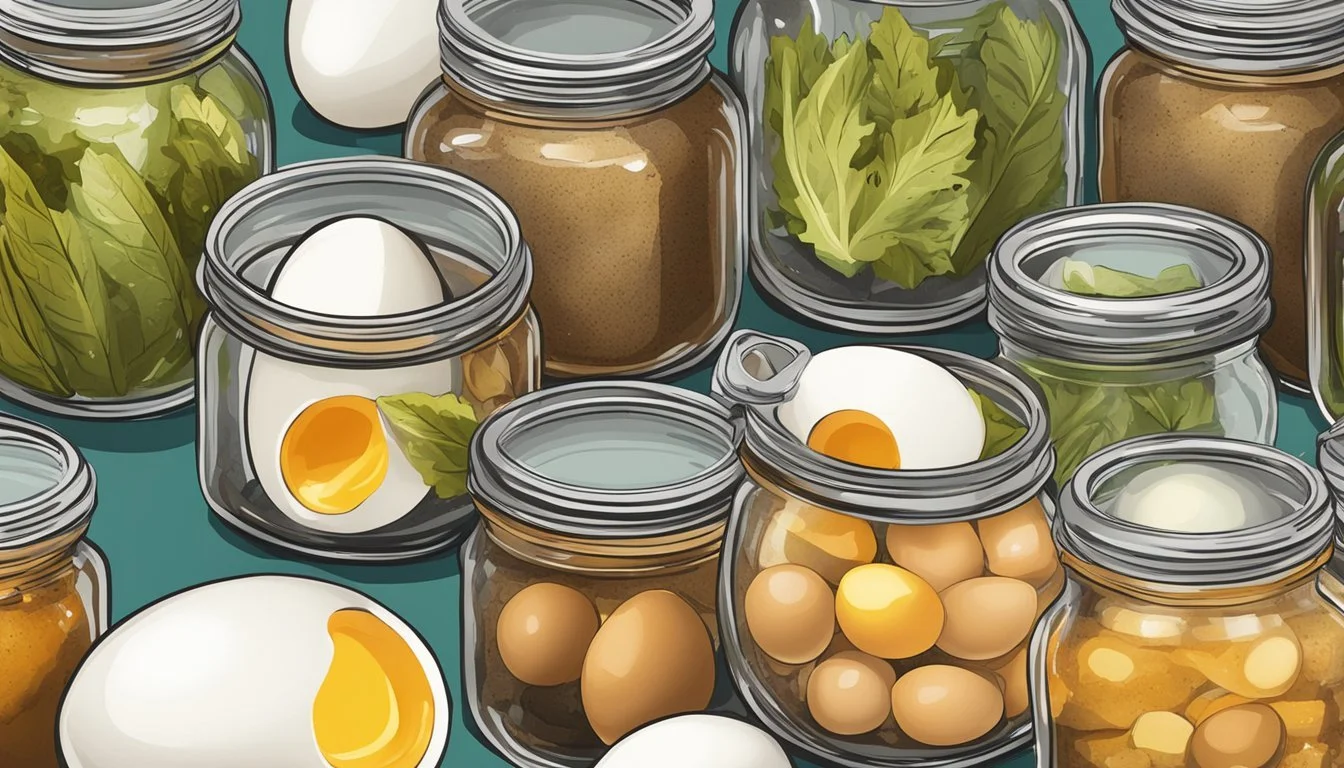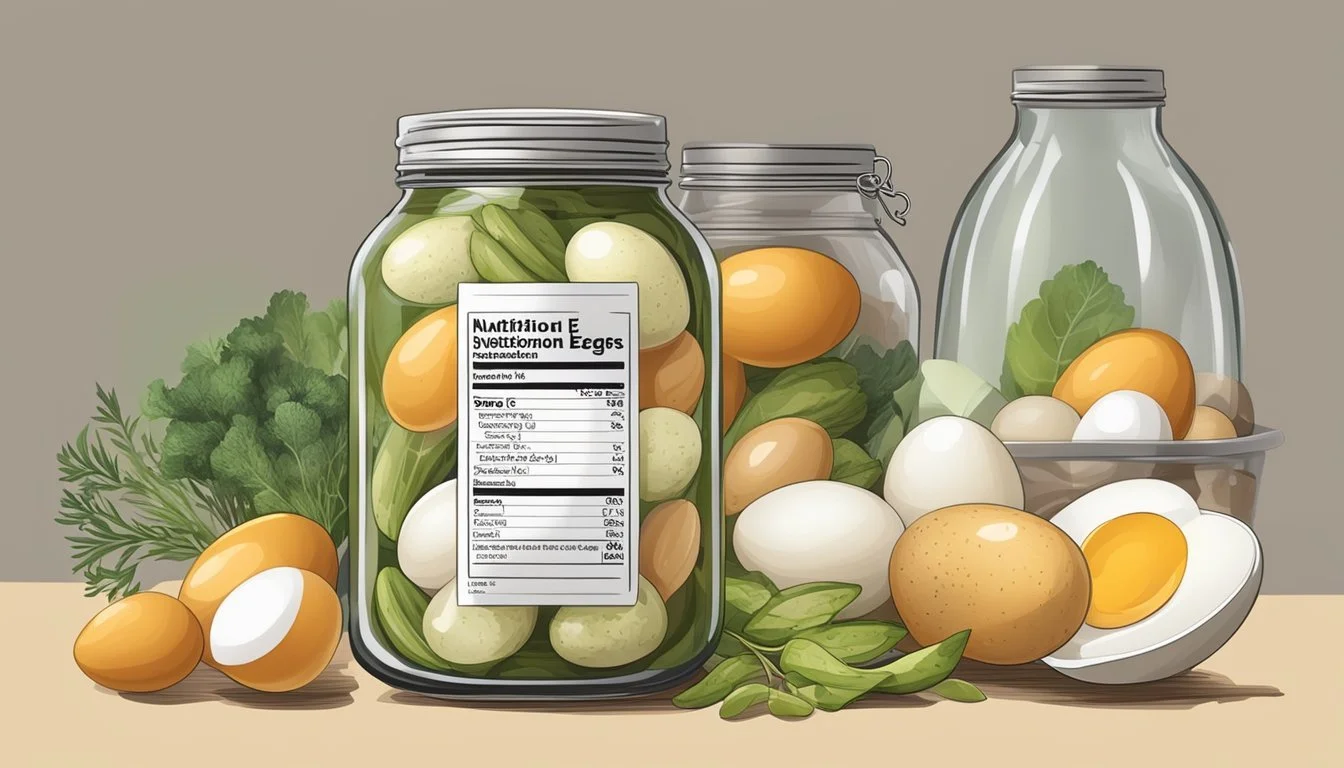Pickled Eggs Substitutes
The Best Alternatives for Your Recipes
Pickled eggs bring a unique zest to various dishes, but sometimes they might not be available or suitable for everyone. For those seeking alternatives, plenty of substitutes can offer similar tanginess and texture. Preserved vegetables such as pickled beets or cucumbers can provide a similar burst of flavor. These vegetables, steeped in a vinegar-based brine with hard-hitting spices, mimic the sour notes typical of pickled eggs.
Another option is marinated tofu, which can absorb the flavors of vinegar, salt, and spices well. This substitute is perfect for those looking for a plant-based alternative without sacrificing the savory and tangy qualities. Marinating the tofu in a similar brine used for pickling eggs can yield a comparable experience, complete with the familiar tang.
Lastly, consider using sauerkraut or kimchi. These fermented options bring their own robust flavor profiles and can be just as versatile in different recipes. Made with the same principles of vinegar and spices, they offer a delightful crunch alongside their acidic punch. For those who enjoy experimenting in the kitchen, these substitutes open up a world of culinary creativity while still satisfying the craving for something pickled.
Understanding Pickled Eggs
Pickled eggs have a rich history and provide unique nutritional benefits. They also require careful attention to the pickling process to ensure safety and quality.
History and Traditional Uses
Pickled eggs have been a staple in many cultures for centuries. Originating in England, they were traditionally used as bar snacks and pub foods. They became popular for their ability to be preserved without refrigeration.
In Victorian England, they were often found in taverns, providing a quick, protein-rich snack. Over time, variations with different spices and vinegars emerged, allowing for regional and personal taste preferences.
Pickling Process and Food Safety
The pickling process involves immersing hard-boiled eggs in a mixture of vinegar, water, salt, and various spices. This brine not only flavors the eggs but also preserves them. Common spices include garlic, chili peppers, and black peppercorns, which add complexity to the taste.
Food safety is critical. Eggs must be fully submerged in the vinegar-based brine to prevent the growth of harmful bacteria like Clostridium botulinum, which causes botulism. The brine should be heated to a boil and then cooled before adding the eggs to ensure the right acidity level. Proper storage in the refrigerator is also essential.
Nutritional Profile of Pickled Eggs
Pickled eggs are a nutritious snack, providing high-quality protein and essential vitamins and minerals like iron.
A single pickled egg contains:
Calories: Approximately 70-80
Protein: About 6 grams
Fat: Roughly 5 grams, with minimal saturated fats
Carbohydrates: Negligible
The addition of vinegar can influence the mineral content slightly, but pickled eggs remain a low-carb, high-protein option. Due to the salt used in the brine, they can be higher in sodium, so individuals monitoring their salt intake should consume them in moderation.
Primary Ingredients in Pickled Eggs
Preparing pickled eggs involves selecting key ingredients that will enhance the flavor and ensure the best results. These include the eggs themselves, the right vinegar, and a variety of spices.
Eggs and the Hard-Boiling Technique
Eggs are the centerpiece of any pickled egg recipe. Choose fresh, medium-sized eggs for consistent results.
Hard-boiling eggs correctly is essential. Place the eggs in a saucepan and cover them with water by an inch. Bring the water to a boil, cover, and remove from heat. Let them sit for 12-15 minutes, then cool in an ice bath.
This method ensures evenly cooked eggs with firm whites and yolks that stay intact.
Choosing the Right Vinegar
Vinegar is a crucial ingredient for pickling. It not only preserves the eggs but also infuses them with tangy flavors.
White vinegar is commonly used due to its strong, clean taste. It maintains the eggs' color.
Apple cider vinegar offers a milder, slightly sweet flavor profile. It's ideal for those seeking a softer acidic touch.
Selecting and Using Spices
Spices enhance the taste of pickled eggs, turning them into a flavorful treat.
Classic pickling spices like mustard seeds, peppercorns, and dill seeds are popular choices. Adjust the mix based on personal preference.
Salt is another essential, not only for flavor but also to balance the vinegar’s acidity.
For variation, consider adding garlic, bay leaves, or even a hint of sugar for sweetness. Always ensure spices are fresh for the best impact on flavor.
Utilize these primary ingredients thoughtfully to create delicious and well-preserved pickled eggs.
Creating the Perfect Brine
Creating the perfect brine is essential for ensuring that pickled eggs are flavorful and well-preserved. This process involves balancing salt and sugar, incorporating aromatic garlic and herbs, and achieving the right levels of acidity and sweetness.
The Role of Salt and Sugar
Salt and sugar are key components in brine. Salt not only enhances flavor but also acts as a preservative, preventing the growth of undesirable bacteria. Typically, about one tablespoon of salt per two cups of water is a good starting point.
Sugar contributes to the preservation process and helps balance out the acidity from the vinegar. It is important to dissolve the salt and sugar fully in the water to ensure an even distribution of flavors. Using two tablespoons of sugar per two cups of water is often ideal.
Adding Flavor with Garlic and Herbs
Garlic and herbs add depth and complexity to the brine. Garlic can be added in the form of whole cloves or sliced pieces. Typically, two to four cloves per jar are sufficient to impart a noticeable garlic flavor.
Herbs such as dill, rosemary, and thyme are excellent choices for adding distinct aromas and tastes. Fresh herbs are generally preferred over dried ones, as they provide a more vibrant flavor. A sprig or two of each herb per jar is usually adequate.
To boost complexity, consider adding spices. Mustard seeds, peppercorns, and bay leaves are popular options. Using about a teaspoon of each per quart of brine enhances both flavor and visual appeal.
The Importance of Acidity and Sweetness Balance
Balancing acidity and sweetness is crucial for the brine. Vinegar provides the necessary acidity required for preservation and flavor. Apple cider vinegar, white vinegar, or a combination of both can be used. For optimal results, use equal parts of vinegar and water.
Sweetness from sugar counteracts the acidity, creating a pleasant taste. Honey can be used as a substitute for granulated sugar for a different flavor profile. Ensuring the right balance usually means starting with a 1-to-1 ratio of vinegar to water with two tablespoons of sugar or honey per cup of liquid.
Ensuring the correct acidity level helps pickled eggs retain their texture and taste. A pH level between 4-4.5 is typically desirable for safe and delicious pickled eggs. Properly balancing these elements results in perfectly flavored and preserved pickled eggs.
Substitute Ingredients for Pickled Eggs
When creating pickled eggs, various substitutions can be made for the main ingredient, the vinegar, and the spices to cater to different tastes and dietary requirements.
Alternatives for Eggs
For those looking to replace traditional eggs, quail eggs are a popular choice. They offer a similar texture and flavor but in a smaller size. Tofu can be used as a vegan substitute, although it will not replicate the exact texture of eggs. Mushrooms can also be pickled to create an earthy alternative with a unique flavor profile.
Vinegar Substitutes
Instead of standard white vinegar, apple cider vinegar provides a slightly sweeter taste. Rice vinegar offers a milder and less acidic option. Red wine vinegar can be used for a richer flavor, while for a unique twist, try using beet juice, which also adds a vibrant color to the pickling liquid.
Spice and Seasoning Variations
Traditional spices like dill, mustard seeds, and bay leaves can be swapped with more adventurous choices. Turmeric gives an earthy flavor and a yellow hue. Adding jalapeños offers heat and a Southwestern kick. Substituting tarragon instead of dill can introduce a delicate, anise-like flavor. For those who enjoy bold flavors, crushed garlic cloves and whole chili peppers can intensify the pickling brine.
Instructions and Preparation Tips
Preparing pickled eggs involves a few essential steps, including peeling the eggs, sterilizing jars, ad combining ingredients for canning. Each step is crucial to ensure the best quality and safety of your pickled eggs.
Peeling and Preparing Eggs
Start with large, fresh eggs. Place the eggs in a saucepan and cover them with water, ensuring the eggs are submerged by at least an inch. Bring the water to a boil. Once boiling, cover the saucepan, remove it from heat, and let it sit for 12-15 minutes.
Afterward, transfer the eggs to a bowl of ice water. This step helps to stop the cooking process and makes peeling easier. Crack the shell all over and peel, starting at the larger end. Peeling under cold running water can help remove stubborn shell pieces.
Sterilization of Jars and Equipment
Sterilizing jars and equipment is crucial for safe canning. Use glass or mason jars for storing pickled eggs. First, wash the jars, lids, and any utensils with hot, soapy water. Rinse well and dry.
To sterilize, place the jars in a large pot of boiling water for at least 10 minutes. Be sure the jars are fully submerged. Use tongs to remove the jars and place them on a clean towel to air dry.
Sterilize lids and bands by simmering them in hot water for several minutes but do not boil. Use immediately for canning.
Combining Ingredients and Canning
Ingredients:
1/3 cup sugar
4 tsp pickling spices
2 cups vinegar
1 cup water
Optional: garlic, chili peppers, onions, bay leaf
In a saucepan, combine the vinegar, water, sugar, salt, and pickling spices. Bring the mixture to a boil over medium-high heat. Reduce the heat and simmer for 5 minutes.
Place peeled eggs into the sterilized jars. Pour the hot brine over the eggs, ensuring they are fully covered. Seal the jars with sterilized lids and let them cool to room temperature before refrigerating.
Store jars in the refrigerator for at least 1-2 weeks before consuming, allowing flavors to develop. Use pickled eggs within 3-4 months for best quality.
Serving and Storing Pickled Eggs
Pickled eggs are versatile, offering various ways to serve as appetizers, snacks, or side dishes. Proper storage can extend their shelf life, ensuring safety and maintaining flavor.
Ideal Pairings and Serving Suggestions
Pickled Eggs make excellent appetizers or snacks on their own. They can be sliced and added to salads or turned into deviled eggs with a tangy twist.
For a tasty side dish, include pickled eggs in a potato salad or combine them with pickled vegetables. Cheese platters, charcuterie boards, and antipasto platters also pair well with them, balancing their tanginess with other flavors. Spices like pepper, mustard seeds, and garlic can enhance servings.
Proper Storage Techniques
Store pickled eggs in glass jars or mason jars to preserve their quality. Ensure the jars are sterilized before use to prevent contamination.
Refrigeration is crucial: keep them cold when storing and limit room temperature exposure to serving time only, no more than 2 hours in the temperature range of 40-140°F. Tightly seal jars to keep eggs fresh and avoid moisture loss, which can affect texture.
Shelf Life and Refrigeration
Properly refrigerated, pickled eggs generally last three to four months. Always check for signs of spoilage, such as off odors or changes in texture.
Unopened jars remain safe for longer periods if kept in cool, dry conditions, away from direct sunlight. It’s advisable to label jars with the pickling date to monitor their freshness. Regular inspection will ensure they remain safe and tasty for consumption.
Customizing Your Pickled Eggs
Customizing pickled eggs allows you to create a unique and flavorful snack tailored to your taste. This guide explores various ways to infuse your eggs with diverse global flavors, introduce spicy elements, and add colorful, creative ingredients.
Infusing with Global Flavors
Transform your pickled eggs by infusing them with ingredients from different cuisines around the world. For an Asian twist, add soy sauce, ginger, and star anise to the brine, bringing depth and umami to the eggs. A Mediterranean flair can be achieved with olive oil, garlic, rosemary, and lemon zest for a vibrant citrusy note.
Mexican-inspired eggs could include jalapeno, cilantro, and lime juice, giving the pickled eggs a refreshing, spicy kick. These adjustments can help turn simple pickled eggs into a culinary journey.
Creating Spicy Pickled Eggs
Adding heat to your pickled eggs can elevate their flavor profile significantly. Include red pepper flakes, jalapenos, or pickled peppers in your brine. For a robust spiciness, habanero or serrano peppers can be used.
Garlic and cumin complement the spice, creating a well-rounded taste. If using a pre-determined recipe, simply increase the quantity of these spicy ingredients.
Remember, the longer the eggs marinate, the spicier they will become. Adjust the spice level based on personal preference and tolerance.
Colorful and Creative Additions
Introducing colorful ingredients not only makes pickled eggs visually appealing but adds extra layers of flavor. Beet juice is a popular choice, turning the eggs a vibrant pink and adding an earthy sweetness.
Red onions or shallots in the brine give a touch of sharpness, while cucumbers and carrots can contribute a refreshing crunch. Dill and mustard seeds bring a classic, tangy twist to the eggs.
By mixing different vegetables and spices, you can customize the texture, color, and flavor of your pickled eggs to suit any occasion.
Variations and Recipe Ideas
This section provides insights into diverse ways to adapt pickled eggs for different dietary needs, creative recipes, and quick preparation methods. Each approach ensures that everyone can enjoy homemade pickled eggs, whether as a healthy snack or a flavorful addition to meals.
Recipe Adaptations for Dietary Needs
For those following specific diets, several tweaks can make pickled eggs more suitable. Low-carb enthusiasts can omit sugar and use alternative sweeteners like stevia.
Vegans and vegetarians may consider pickling tofu or seitan as a non-egg substitute.
Allergic individuals can opt for quail eggs if they tolerate them better than chicken eggs. Adjusting spices and salt content caters to blood pressure concerns. These variations ensure that everyone can indulge in this tasty, versatile snack.
Innovative Pickled Egg Recipes
Innovative recipes elevate traditional pickled eggs to new heights. Spicy sriracha-infused pickled eggs bring a fiery twist, using sriracha sauce mixed into the brine.
For a tangy option, consider citrus pickled eggs flavored with lemon or lime zest. Herb-infused eggs utilize fresh herbs like dill or rosemary for a refreshing and aromatic profile.
Another creative idea is beet-pickled eggs, which not only taste great but also have a stunning pink hue, making them an attractive addition to any dish. Experimenting with different flavors and colors can make homemade pickled eggs an interesting culinary adventure.
Quick Pickled Eggs for Time-Savers
For those short on time, quick pickled egg methods are a lifesaver. Boiling and peeling the eggs first, then marinating them in a hot, flavorful brine can significantly reduce preparation time.
A simple vinegar, water, salt, and sugar mixture can serve as a base. Adding ingredients like garlic, dill, and chili flakes can enhance the flavor.
Refrigerate for at least 24 hours to let the flavors meld. This method is perfect for those seeking an easy pickled eggs recipe without compromising on taste.
Nutritional Information and Health Benefits
Pickled eggs offer a variety of nutritional benefits that make them an appealing addition to many diets. This section breaks down their macro and micronutrient content, health advantages, and potential considerations and risks.
Analyzing Macros and Micronutrients
Pickled eggs are a low-calorie option, with approximately 70 calories per egg. They are rich in protein, offering around 6 grams per egg, making them an excellent source for muscle repair and growth.
They contain minimal carbohydrates and no fiber, which aligns them with low-carb diets. Fat content is also low, particularly if the yolk is removed, which eliminates saturated fat and cholesterol. This might appeal to those monitoring their heart health.
Nutrient-wise, pickled eggs are a good source of potassium, vitamin A, and calcium. The pickling process can increase the sodium level, so caution is advised for individuals on a low-sodium diet.
Health Advantages of Consuming Pickled Eggs
Pickled eggs are not only high in protein but also loaded with essential nutrients. Vitamin A supports immune function and vision health, while calcium is crucial for bone density and strength. The presence of potassium aids in maintaining proper heart and muscle function.
They can promote digestive health due to the probiotics found in the pickling solution, which can foster a healthy gut biome.
Their low-calorie and high-protein profile makes them a satiating snack, beneficial for weight management. This composition helps regulate hunger and energy levels, making them suitable for various dietary goals.
Considerations and Potential Risks
Though pickled eggs provide numerous health benefits, there are potential considerations. The high sodium content may pose risks for individuals with hypertension or those advised to follow a low-sodium diet.
While the protein and nutrient benefits are significant, it's essential to consume them in moderation due to the possible rise in cholesterol levels if the yolks are included.
For those with egg allergies, pickled eggs are obviously not suitable and alternative egg substitutes may be necessary. These substitutes, such as mashed banana or flaxseed, can offer similar texture and binding properties in recipes without the risks associated with egg consumption.








